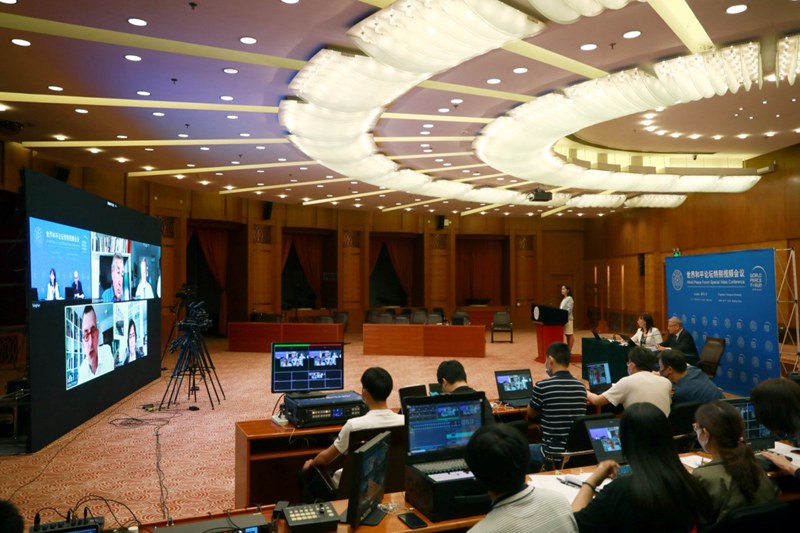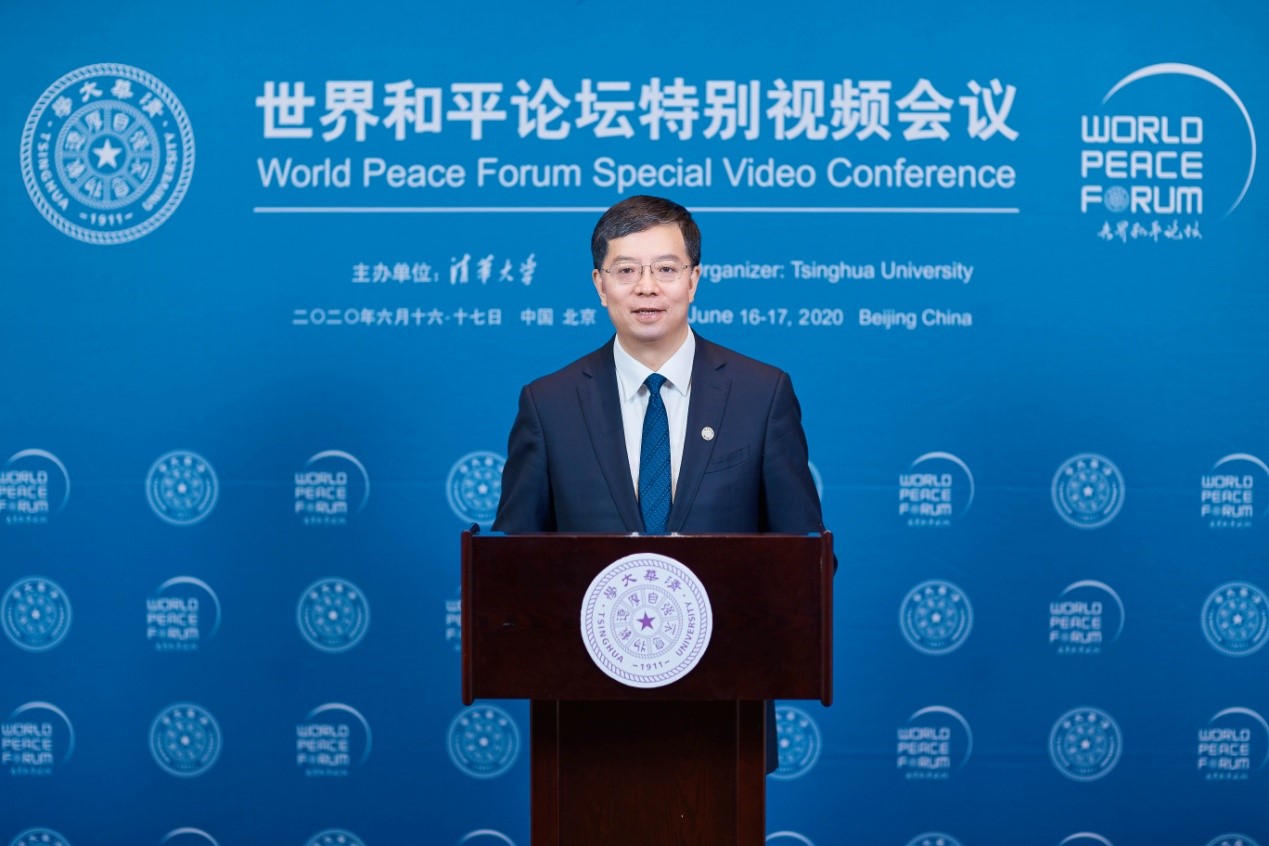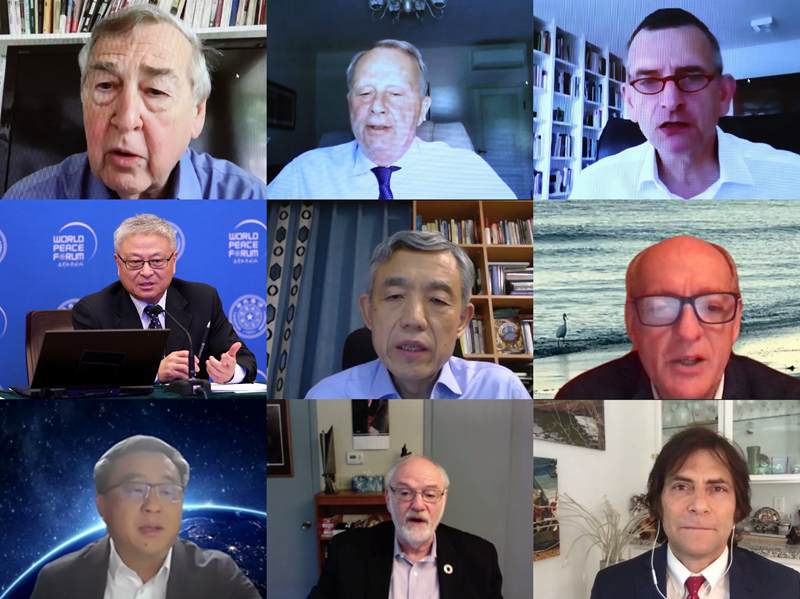


The 2020 World Peace Forum Special Video Conference opens on June 16, 2020, under the theme “Post-Pandemic Era: China and the World.” (Photo courtesy of Tsinghua University)
The 2020 World Peace Forum (WPF) Special Video Conference under the theme “Post-Pandemic Era: China and the World” concluded on June 17. As China’s first non-governmental high-level forum on international security initiated by Tsinghua University since 2012, the two-day event brought together renowned international political leaders and experts to discuss ways to deal with new security challenges facing the world in the post-pandemic era.
Due to the impact of COVID-19, this year’s event was held online. “Now that the COVID-19 pandemic seems to be setting global politics onto an undesirable trajectory, we think it is our responsibility to convene this special conference, provide a platform for leading international strategists to freely interact, and try to find effective prescriptions to problems threatening world peace,” Qiu Yong, president of Tsinghua University, said in his opening remarks.

President of Tsinghua University Qiu Yong delivers the opening remarks of the 2020 World Peace Forum Special Video Conference held June 16-17, 2020. (Photo courtesy of Tsinghua University)
During the panel discussion on the theme “World Order after the COVID-19 Crisis”, Graham Allison, the Douglas Dillon professor of government at Harvard University, said the coronavirus crisis provides a vivid reminder that each nation faces external threats that it cannot defeat by acting alone, adding that the US and China have come to recognize each other as “insufferable but inseparable conjoined twins”.
“I hope we can get our minds around a complicated, difficult, challenging rivalry going forward, but one in which we understand that we have shared interest as well as competing interest. And we have to manage to do that in order to survive,” Allison said.

Screenshot of experts participating in the 2020 World Peace Forum Special Video Conference. (Photo courtesy of Tsinghua University)
Alexander A. Dynkin, president of the Primakov Institute of World Economy and International Relations in Russia, said multilateral responsible leadership in the future requires universal application of the principles of international law and rejection of double standards.
Volker Perthes, CEO and director of the German Institute for International and Security Affairs, believed that the pandemic is a revolutionary force or a multiplier of international dynamics and trends, and the world will have more demand and less supply of global cooperation and governance.
According to Perthes, the pandemic is likely to sharpen inequalities both within countries and between nations and also lead to a sectorial de-globalization. “International organizations are likely to become more polarized or weakened if the US policy of exit from these institutions is not reversed, and that would lead to more regional cooperation, including in security affairs,” he noted.
Yan Xuetong, dean of the Institute of International Relations at Tsinghua University, argued that the world will have an “order of bad faith” as there will be no global leadership for at least the next decade, adding that international treaties or agreements will be weakened and the roles of international organizations are likely to decline in the future. “However, I am still optimistic about the future,” he concluded.

Screenshot of the panel discussion on the theme “China-US Relations in the Post-Pandemic Era” at the 2020 World Peace Forum Special Video Conference.
With regards to China-US relations, Zhu Min, former Deputy Managing Director of the International Monetary Fund, noted during the panel discussion on the theme “China-US Relations in the Post-Pandemic Era” that the China-US relationship is deteriorating.
Zhu argued that the two sides must hold a constructive dialogue to move forward and solve issues like trade, supply chain and technology, while stressing the importance of talks between China’s senior diplomat Yang Jiechi and US Secretary of State Mike Pompeo in Hawaii.
“The world urgently needs both sides to play a leading role in this difficult time, as it is not only important for the US and China, but also for the whole world,” he added.
Echoing Zhu’s comments, Susan Shirk, professor at the University of California, San Diego, said the deterioration of relations is very dangerous “not just because of the failure to cooperate on the pandemic, but also because the decoupling of our highly integrated economies, societies and universities would be tragically costly.”
It is essential to bring the business community back on board and to stop the coercive diplomacy in the midst of the pandemic, Shirk said, adding that China’s promise to share therapies and vaccines with people throughout the world is laudable.
According to Wang Jisi, president of the Institute of International and Strategic Studies at Peking University, the China-US relationship is now suffering from forceful disengagement after steady progress in engaging each other for four decades.
Wang stressed that the pace and scope of the downward spiral of China-US relations remain uncertain, but three bottom lines should be upheld in bilateral relations: avoiding war, maintaining a certain scale of economic and trade cooperation and financial stability, and keeping people-to-people contact and educational exchanges.
“I only hope that people like us participating in this panel discussion will continue to engage and inform each other of where things are moving and get better prepared for future risks,” he concluded.

 Award-winning photos show poverty reduction achievements in NE China's Jilin province
Award-winning photos show poverty reduction achievements in NE China's Jilin province People dance to greet advent of New Year in Ameiqituo Town, Guizhou
People dance to greet advent of New Year in Ameiqituo Town, Guizhou Fire brigade in Shanghai holds group wedding
Fire brigade in Shanghai holds group wedding Tourists enjoy ice sculptures in Datan Town, north China
Tourists enjoy ice sculptures in Datan Town, north China Sunset scenery of Dayan Pagoda in Xi'an
Sunset scenery of Dayan Pagoda in Xi'an Tourists have fun at scenic spot in Nanlong Town, NW China
Tourists have fun at scenic spot in Nanlong Town, NW China Harbin attracts tourists by making best use of ice in winter
Harbin attracts tourists by making best use of ice in winter In pics: FIS Alpine Ski Women's World Cup Slalom
In pics: FIS Alpine Ski Women's World Cup Slalom Black-necked cranes rest at reservoir in Lhunzhub County, Lhasa
Black-necked cranes rest at reservoir in Lhunzhub County, Lhasa China's FAST telescope will be available to foreign scientists in April
China's FAST telescope will be available to foreign scientists in April